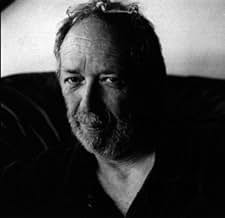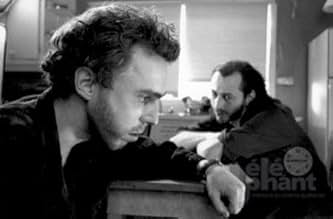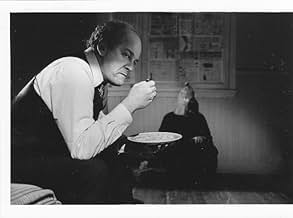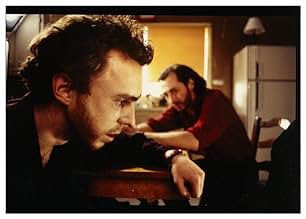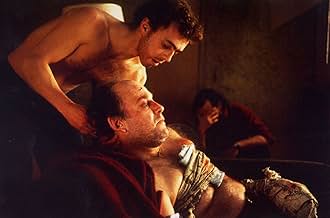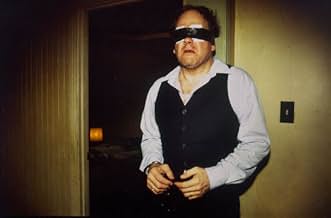A dramatization of the infamous Canadian terrorist abduction & murder of a government minister by a cell of The Quebec Liberation Front.A dramatization of the infamous Canadian terrorist abduction & murder of a government minister by a cell of The Quebec Liberation Front.A dramatization of the infamous Canadian terrorist abduction & murder of a government minister by a cell of The Quebec Liberation Front.
Hugolin Chevrette-Landesque
- Neveu
- (as Hugo C. Landesque)
- Director
- Writers
- All cast & crew
- Production, box office & more at IMDbPro
Featured reviews
Octobre - I have vivid memories of this sad time. I hoped this would be a film with a message for history. I didn't see it.
The idea that characters in this film tried to break out of their role in some human fashion is a mystery to me. The results of real-life October 1970 was not as complex as this film claims: The FLQ kidnapped and murdered a politician. That is not human - it is inhuman.
Another idea in this film is that the terrorists were simply working class people who got fed up with oppression and tried to wake up a nation. Once again the truth I remember in 1970 wasn't that complex. By kidnapping and murdering they became the oppressors they hated. Kafka was right - the rebel who kills the oppressor eventually becomes the oppressor.
Saddest of all for me is the film's implicit message that the FLQ terrorists were somehow faced with a dichotomy: to remain oppressed or to kill their kidnap victim for recognition.
How different is that from Islamic terrorists flying planes into buildings and others who think that they too are oppressed and unrecognized? I hope someone will someday make another film about this sad chapter in Quebec/Canadian history. And I hope that film will portray a vivid lesson that I learned living through that awful time: Murder and violence is an affront to humanity and will never build a civil or livable country! THAT is the only lasting message I remember from the October Crisis.
The idea that characters in this film tried to break out of their role in some human fashion is a mystery to me. The results of real-life October 1970 was not as complex as this film claims: The FLQ kidnapped and murdered a politician. That is not human - it is inhuman.
Another idea in this film is that the terrorists were simply working class people who got fed up with oppression and tried to wake up a nation. Once again the truth I remember in 1970 wasn't that complex. By kidnapping and murdering they became the oppressors they hated. Kafka was right - the rebel who kills the oppressor eventually becomes the oppressor.
Saddest of all for me is the film's implicit message that the FLQ terrorists were somehow faced with a dichotomy: to remain oppressed or to kill their kidnap victim for recognition.
How different is that from Islamic terrorists flying planes into buildings and others who think that they too are oppressed and unrecognized? I hope someone will someday make another film about this sad chapter in Quebec/Canadian history. And I hope that film will portray a vivid lesson that I learned living through that awful time: Murder and violence is an affront to humanity and will never build a civil or livable country! THAT is the only lasting message I remember from the October Crisis.
In regards to previous comments, a few things need to be said. First, this movie is not a documentary and it doesn't have the pretension to be one. So I think you need to keep this in mind, and not expect to hear experts come to the camera and give «neutral» and «objective» clarification.
Second, the movie is based on a book written by one of the felquiste. So it would be incorrect to jump to the other extreme and say that the story is «fictionalized». The book, as well as the movie, is written in plain honesty, many years after the events that took place in 1970.
Keeping in mind that the movie depicts the events as seen through the eyes of one of the perpertrators, the movie is extremely effective in showing how Ideals can grasp people, how revolutions (often failed) occur, what it means to believe in something with all your heart. It also shows, and you must be blind not to see this, how events like these might as well take a proportion that was not intended, and that playing with the lives of individuals is not as easy as it might seem in the first place.
Octobre shows the real meaning of politics, of a political event, of a revolution. It shows that political events are never totally black or white.
You might say that because Falardeau is a separatist he doesn't give a neutral or objective point of view, and thus, the movie is biased. I'll be ready to accept this critique when somebody shows me a way to depict such an event in a neutral and objective way. A lot of people won't be able to appreciate Octobre for two possible reasons : a) they lack the necessary background to understand the story, or b) they view the movie as another absurd propaganda from separatists.
Other than that, Falardeau renders very well the tension that builds inside the small house where five people are stuck, waiting for the government to negotiate. It is a very emotional movie ; I saw the movie in Montréal when it came out. There weren't many people in the movie theatre. When the movie ended, I stood up to leave and noticed two older people, a man and a woman. Both we're still looking at the blank screen, silent. I thought that they were probably involved in the FLQ, that they were probably arrested also. Watching this movie must have been very difficult for them, at least this is what their eyes told me.
Second, the movie is based on a book written by one of the felquiste. So it would be incorrect to jump to the other extreme and say that the story is «fictionalized». The book, as well as the movie, is written in plain honesty, many years after the events that took place in 1970.
Keeping in mind that the movie depicts the events as seen through the eyes of one of the perpertrators, the movie is extremely effective in showing how Ideals can grasp people, how revolutions (often failed) occur, what it means to believe in something with all your heart. It also shows, and you must be blind not to see this, how events like these might as well take a proportion that was not intended, and that playing with the lives of individuals is not as easy as it might seem in the first place.
Octobre shows the real meaning of politics, of a political event, of a revolution. It shows that political events are never totally black or white.
You might say that because Falardeau is a separatist he doesn't give a neutral or objective point of view, and thus, the movie is biased. I'll be ready to accept this critique when somebody shows me a way to depict such an event in a neutral and objective way. A lot of people won't be able to appreciate Octobre for two possible reasons : a) they lack the necessary background to understand the story, or b) they view the movie as another absurd propaganda from separatists.
Other than that, Falardeau renders very well the tension that builds inside the small house where five people are stuck, waiting for the government to negotiate. It is a very emotional movie ; I saw the movie in Montréal when it came out. There weren't many people in the movie theatre. When the movie ended, I stood up to leave and noticed two older people, a man and a woman. Both we're still looking at the blank screen, silent. I thought that they were probably involved in the FLQ, that they were probably arrested also. Watching this movie must have been very difficult for them, at least this is what their eyes told me.
First off this movie as to be taken for what it is worth - A historical reconstruction of what might of happen to the four men who kidnapped Pierre Laporte, Ministère du Travail in the cabinet of Robert Bourassa's provincial liberal government in Quebec.
Once that this is taken into consideration, the movie can really be enjoyed. It really differs from any political statements or supposedly "objective" journalist piece on this unforgivable event. What Pierre Falardeau was going for here was to demonstrate the psychological nightmare that these five men went through during that ordeal. This movie is not a historical reconstruction of the events of the October Crisis, and although Falardeau - a personal friend of Francis Simard, one of the kidnappers- is a well-known supporter of Quebec's independence movement, he does not glorify at all what these men did - nor does he criticize it. That's what makes the beauty of this film: Its neutrality in the portrayal of the ordeal. The ordeal is not presented politically, economically, and socially; it is presented in a confined, at times claustrophobic atmosphere. And again, it is about the men involved and how unbearable it must have been in that house. And that fact, i feel is extremely well demonstrated.
Most, if not all, of the movies or documentaries on this event are obviously subjective. The goal of this film is to try and make your feel what dose people must have felt- and that is a very interesting and refreshing take on the event.
Once that this is taken into consideration, the movie can really be enjoyed. It really differs from any political statements or supposedly "objective" journalist piece on this unforgivable event. What Pierre Falardeau was going for here was to demonstrate the psychological nightmare that these five men went through during that ordeal. This movie is not a historical reconstruction of the events of the October Crisis, and although Falardeau - a personal friend of Francis Simard, one of the kidnappers- is a well-known supporter of Quebec's independence movement, he does not glorify at all what these men did - nor does he criticize it. That's what makes the beauty of this film: Its neutrality in the portrayal of the ordeal. The ordeal is not presented politically, economically, and socially; it is presented in a confined, at times claustrophobic atmosphere. And again, it is about the men involved and how unbearable it must have been in that house. And that fact, i feel is extremely well demonstrated.
Most, if not all, of the movies or documentaries on this event are obviously subjective. The goal of this film is to try and make your feel what dose people must have felt- and that is a very interesting and refreshing take on the event.
8N.L.
I saw this film shortly after it was released as part of a "sneak peak" series in Philadelphia. Not a single member (including me) of the otherwise well-read and educated audience knew anything about the historical events depicted in the film. This was embarrassing to say the least! In the discussion afterward, it was obvious that the audience universally appreciated the film, but it was also apparent that it would be a hard sell to U.S. ticket-buyers. So it became no surprise that it was not picked up for U.S. distribution. Because of woeful ignorance of most-things-Canadian that exists south of the border - and god forbid! subtitles - OCTOBRE vanished from our radar in the U.S.
I have seen this movie twice and both times with English subtitles, but it still doesn't take away from a film that is both powerful and tragic at the same time. It's powerful in that it shows that revolutions and other such acts are carried out by ordinary people placed in extraordinary circumstances. It's tragic because all of the characters attempt to break out their assigned roles and see one another as human and in the end they can't and play them out to the end. The FLQers and their victim are not able to transcend their society and its dictates and so therefore, what happened happened. The only problem I have with this film is the element of inevitability to it, in which in the opening minutes one already knows that it is not bound to begin or end well. That being said, it is worth anyone's time to watch, to study and to understand the tragedy that was the October Crisis in both Quebec and Canada
Did you know
- TriviaPierre Falardeau: The homeless man up the stairs in the second subway station scene.
- ConnectionsEdited into Black October (2000)
Details
- Release date
- Country of origin
- Official site
- Languages
- Also known as
- Outubro Violento
- Filming locations
- Production companies
- See more company credits at IMDbPro
Box office
- Gross US & Canada
- $349,633
Contribute to this page
Suggest an edit or add missing content

